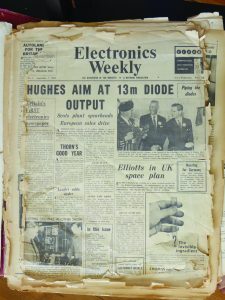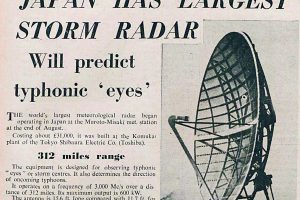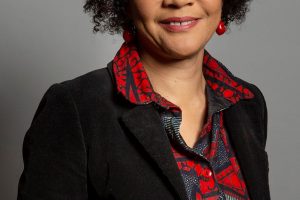This newspaper makes journalistic history. It is the first newspaper in the United Kingdom to be devoted specifically to electronics – Britain’s fastest growing industry.
It will enable research workers, engineers, technical and business executives, government officials, sales representatives, and many other groups of people to keep in touch with the broad developments in world electronics without becoming too bogged down with the detail.“Electronics Weekly will complement the editorial service already provided by our sister monthly technical journal, British Communications & Electronics.
Emphasis will be given both to outstanding developments and applications. Week by week it is also our aim to publish news on electronic trends and developments abroad.
Letters to the Editor will be considered for publication in future issues.”
Sixty years on, the political, technological and business landscapes may have changed, but we have not lost sight of the intentions set out when the paper was founded. The ambition continues to be to support and inform the same audience identified in the original article: research workers, engineers, technical and business executives, government officials, sales representatives, and many others. We don’t want to narrow our audience.
Some things have changed in the interim. Letters to the Editor, for example, have been translated into the opportunity to instantly respond with comments to the stories and blog posts of the day appearing on our website, electronicsweekly.com, which is a mere 26-years old.
However, the main goals outlined sixty years ago still hold true. We will continue to keep in touch with the broad developments across the world of electronics, with an emphasis on outstanding developments, applications and trends (although our Technology Editor Steve Bush is happy to ‘get bogged down in the detail’, too, when time permits).
Electronics, in its many and varied forms, is such an interesting, vital and fast‑moving area to cover. We can only hope that in the next 60 years it once again becomes Britain’s fastest growing industry.
Finally, thank you to all our contributors, advertisers and, most of all, readers who have shared the journey. We hope you enjoy this special 60th supplement to Electronics Weekly.
Tsugio Makimoto welcomes the increasing use of sensors to automate support for everyday activities
Sir Robin Saxby has continued backing the projects he believes in since he retired from Arm in 2007
Nigel Toon advises us not to hope to understand how AI systems work – it is numbers moving through silicon
Dick Skipworth has lived through industry highs and lows and says they usually bring new opportunities
Luc Van den hove believes tailored tech will be crucial for rebuilding economies in a post-covid world
Rupert Baines acknowledges that although predicting the future is fun, he knows he will probably not get it right
Peter Claydon grew up alongside the electronics industry and is optimistic about the future of ‘deep tech’
Steve Bush finds treasures in the pages of the first edition of Electronics Weekly and tracks down companies still trading
Alun Williams takes a tour of programming languages developed over the past 60 years, a veritable Tower of Babel
Caroline Hayes asks women engineers how to attract girls to STEM, and to discuss their work and study experiences
 Electronics Weekly Electronics Design & Components Tech News
Electronics Weekly Electronics Design & Components Tech News




